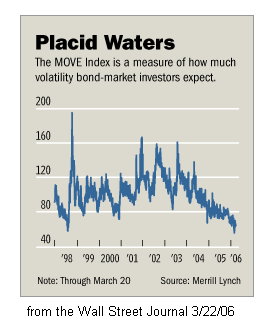
In a nutshell, this chart shows how much investors of debt securities demand back in terms of yield. This chart relates a nice picture back to us regarding the general sentiments regarding risk, and how much return should compensate for that risk. The relationship of credit-spreads between what is considered "risky" and "riskless" shows very well the risk-reward expectations of the investing public. Basically the yellow and the red line compare how much "extra" return is expected when investing in securities other than the completely riskless U.S. treasuries market (the bonds issued by the U.S. government). Why does this picture scare me?
1.) People are no longer afraid of credit risk, expecting a measly 1% spread for barely investment grade securities and a little under 2% for emerging market sovereigns (usually considered pretty risky, but given the fact that "emerging market" has become a buzzword for growth and riches now-a-days, nobody really thinks about default or non-payment). With the easy availability of credit default swaps (derivative instruments that allow an investor to completely diversify out of default risk--provided the counter-party does not double-default... but who knows?) brunting the bulk of the uncertainties with investing in instruments of dubious integrity.
2.) To get the return required for yield hungry U.S. investors, institutions and money managers (alright alright, mostly hedge funds...dammit) have been using substantially higher leverage to capture ever decreasing returns. If you think credit spreads are bad, you should see how much people are willing to pay for equities these days (15-20x earnings on normalized businesses not unusual!) But yeah, here's a picture of how much hedge funds are levered. Prime brokers (firms who execute trades, lend money, and provide various other financial and administrative services to investment funds) have been literally giving money away since late 2003. Who can blame them? Money grew on trees as we were coming out of the tech bubble, all that extra cash needed to go somewhere, the new wonder-kids of finance at hedge funds are 'good' at making money all of a sudden because everything is going up, and the fees on these borrowings are not half bad.

3.) The justification for this complete negligence of investment sense is the circular argument that derivatives and credit default swaps has permanently made financial markets safer and more liquid, when the wide availability of these derivatives were a product of a secular bull-market driven by the wide availability of money supply in the first place. A paradox of the chicken and the egg is here. When I think about it, it makes my head hurt, because... first of all... would derivatives and credit default swaps be so easy to finance if it weren't for the fact that volatility was low and asset prices were perceived as sound? Second of all... would asset prices be sound and leverage/money be so easily dished out if it weren't for the fact that derivatives and credit default swaps has created "permanently" less risk and much more trading and liquidity? So, look at the two charts below... is it the chicken or the egg?


If I'm brilliant enough to call what's supposed to happen next as a result of this non-sense, I would be making millions of dollars right about now (if not billions)... I don't claim I know what's going on, but I do know that somebody has to be getting the short end of the deal. When there's a winner that has diversified away all his/her default risk and volatility risk, somebody else is taking it on--even if that somebody else has diversified that risk away themselves, then that somebody else's somebody else will be the one brunting the blow. Even if it comes full circle, somebody will probably have to default if things get bad enough.
I just wanna see what happens in a bear market, when liquidity suddenly dries up and trading grinds to a slow. When everyone wants to sell, you can bet this scenario of permanently lower volatility/risk/returns, higher leverage, and the happy-go-lucky world of record-high dow closings and never-ending LBO/M&As will be less enthusiastic.
Fortune doesn't favor the bold these days, it favors everybody. Virgil wouldn't be quite as poignant on courage if he saw what's happening today. Bankers winning on fees and investment funds winning on returns forever and ever seems like a utopia, but utopias are never quite so economically viable--for an extended period of time anyway.
No comments:
Post a Comment